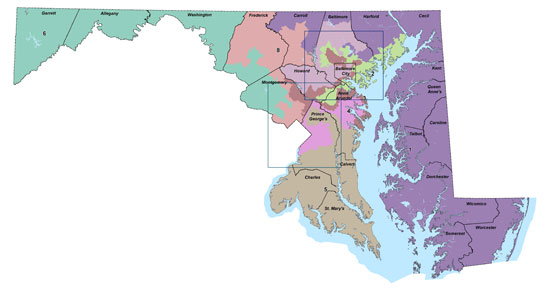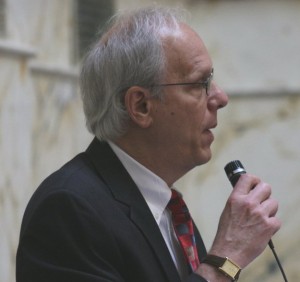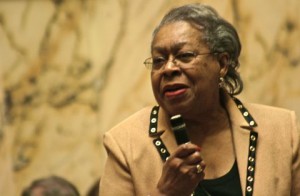‘Bilateral disarmament’ proposed to reform congressional redistricting
By Len Lazarick
[email protected]
Sen. Paul Pinsky, a leader of the left in the state Senate, freely concedes he’d like to see as many “liberals and progressives” elected to Congress as possible.
But the Prince George’s Democrat also acknowledges that Maryland congressional district lines he voted for in 2011 are among the least compact in the nation as well as unfair. He’d like to reform the process in Maryland without the “unilateral disarmament” that would undermine getting Democrats elected to Congress while Republican-controlled legislatures in other states continued to gerrymander for partisan gain.
On Friday, Pinsky introduced legislation that provides for what might be called “bilateral disarmament” on redistricting, one of several bills this session on reapportionment and redistricting.
A Republican state would be paired with Maryland
Pinsky’s bill “is contingent on the enactment of a nonpartisan districting process by another state that has between six and ten seats in the United States House of Representatives and both houses of that state’s legislature are controlled by a party other than the party that controls the General Assembly of Maryland.”
Pinsky estimates that as many as six to 10 Republican-dominated states would qualify under that clause.
Pinsky’s bill, co-sponsored by two Republicans and three Democrats, also takes the governor and other elected officials out of the process by creating a five-member bipartisan commission that would draw the lines. The House speaker, Senate president and minority leaders in each chamber would appoint one member each and the fifth member would be selected by a majority of the other commissioners, so the final choice would be bipartisan.
Governor now controls proposal
The current redistricting process is entirely in the hands of the governor, who must submit a bill reflecting the Census taken every 10 years. In 2011, Gov. Martin O’Malley created a five-member “advisory committee” – not covered by the Open Meetings Act – that was chaired by his appointments secretary, and included House Speaker Michael Busch, Senate President Mike Miller, a Democrat (later convicted of federal tax evasion), and a former Republican delegate who was not selected by members of his party.
Under Pinsky’s bill, none of the appointees to the new commission he’s proposing may hold elective or appointive office in the federal, state or local governments.
Pinsky notes that California created a nonpartisan process that still wound up maintaining its Democratic majority in the U.S. House, despite putting incumbents of both parties in the same districts.
Pinsky points to a Jan. 4 column by Dana Milbank in the Washington Post that showed Democratic congressional candidates nationwide had nearly 1.4 million more votes than congressional Republicans, but still could not regain control of the House of Representatives due to gerrymandering.
Other bills create redistricting task force
Two other bills introduced this session would not go as far as Pinsky’s by calling for a task force to study the issue.
Sen. Delores Kelley, D-Baltimore County, introduced legislation to create a 16-member task force to study both congressional and legislative redistricting. The task force would include senators, delegates, representatives of both parties, the League of Women Voters, ACLU and civil rights groups. Kelley’s bill has six Democratic co-sponsors and three Republicans.
Kelley was one of two Democratic senators who filed an unsuccessful lawsuit against last year’s legislative redistricting.
Del. Susan McComas, R-Harford, introduced a nearly identical bill for a 13-member study commission on Wednesday, with 25 Republican co-sponsors and three Democrats.

MarylandReporter.com is a daily news website produced by journalists committed to making state government as open, transparent, accountable and responsive as possible – in deed, not just in promise. We believe the people who pay for this government are entitled to have their money spent in an efficient and effective way, and that they are entitled to keep as much of their hard-earned dollars as they possibly can.



